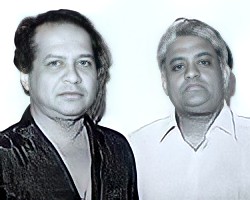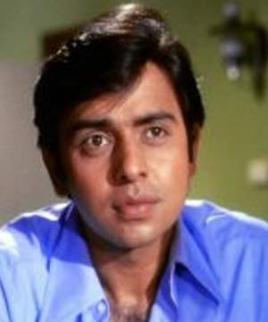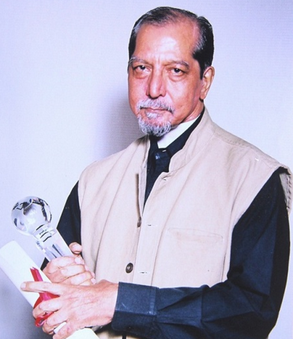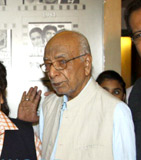
Sanjeev Kumar was an Indian actor. He is well remembered for his versatility and genuine portrayal of his characters. He acted in genres ranging from romantic dramas to thrillers, and was voted the seventh greatest actor of Indian cinema of all time in a poll conducted by Rediff.com. His double role in the film Angoor was listed among the 25 best acting performances of Indian cinema by Forbes India on the occasion of celebrating 100 years of Indian Cinema.

The Filmfare Best Director Award is one of the main awards presented given by the annual Filmfare Awards to recognise directors working in Hindi cinema. It was first presented in 1954 in the inaugural year.

Laxmikant–Pyarelal were an Indian composer duo, consisting of Laxmikant Shantaram Kudalkar (1937–1998) and Pyarelal Ramprasad Sharma . They composed music for about 750 Hindi movies from 1963 to 1998, working for almost all notable filmmakers, including Raj Kapoor, Dev Anand, Shakti Samanta, Manmohan Desai, Yash Chopra, K. Balanchander, Boney Kapoor, J. Om Prakash, Raj Khosla, L V Prasad, Subhash Ghai, Mahesh Bhatt, K Viswanath and Manoj Kumar.
The Filmfare Lyricist Award is given by the Filmfare magazine as part of its annual Filmfare Awards for Hindi films.

Aandhi (transl. 'Storm') is a 1975 Indian political drama film starring Sanjeev Kumar and Suchitra Sen, and directed by Gulzar. At the time it was alleged that the film was based on the life of the then-Prime Minister Indira Gandhi and her relationship with her estranged husband, but in reality, only the look was inspired by the politician Tarkeshwari Sinha and Indira Gandhi. The story is based on a chance meeting of an estranged couple after several years, when wife Aarti Devi, now a leading politician happens to stay in the hotel run by her husband during an election campaign. The movie is noted for its songs composed by Rahul Dev Burman, written by Gulzar and sung by Kishore Kumar and Lata Mangeshkar.

The IIFA Award for Best Actress is given by the International Indian Film Academy as part of its annual award ceremony for Hindi films, to recognise a female actor who has delivered an outstanding performance in a leading role. The recipient is chosen by viewers and the winner is announced at the ceremony. The current recipient is Alia Bhatt who took home her 4th award for Gangubai Kathiawadi making her the most awarded actress in this category.

Nandini Karnataki, known mononymously as Nanda, was an Indian actress who appeared in Hindi and Marathi films. Regarded as one of the finest actresses of Indian cinema, her career spanned over 30 years. She is best known for her performances in Chhoti Bahen, Dhool Ka Phool, Bhabhi, Kala Bazar, Kanoon, Hum Dono, Jab Jab Phool Khile, Gumnaam, Ittefaq, The Train and Prem Rog.

Vinod Mehra was an Indian actor in Hindi films. He started out as a child actor in the mid 1950s before starting his film career as an adult in 1971. He acted in over 100 films from the 1970s through to his death at the age of 45 in 1990. He was also the producer and director of the film Gurudev which was released 3 years after his death.

Satyam Shivam Sundaram is a 1978 Indian Hindi-language romantic drama film produced and directed by Raj Kapoor and written by Jainendra Jain, starring Shashi Kapoor and Zeenat Aman. The film's original soundtrack was composed by Laxmikant–Pyarelal. It is a social drama about the differences between physical and spiritual love. Satyam Shivam Sundaram was released on 24 March 1978 on the day of Holi. The film was dedicated to the iconic playback singer Mukesh, who was the voice of Raj Kapoor in many films. He died two years before the film's release and his last recorded song was part of this movie.

Vidya Sinha was an Indian actress who acted in Hindi films, most known for Rajnigandha (1974), Chhoti Si Baat (1975) and Pati Patni Aur Woh (1978). She started her career as a model and won the Miss Bombay title. Her first movie was Raja Kaka (1974) opposite Kiran Kumar. However, fame came to her through the low-budget break-away hit Rajnigandha (1974), directed by her mentor Basu Chatterjee. She acted in several films after which she took a hiatus. Returning to acting in the later part of her life, she acted in several TV serials and the Salman Khan movie Bodyguard (2011).
Sulakshana Pandit is an Indian playback singer and former Bollywood leading lady belonging to the Mewati Gharana.

Woh Rehne Waali Mehlon Ki is an Indian Hindi language Indian television series that aired on Sahara One channel. The series ran from 30 May 2005 and ended on 20 January 2011. It became the longest running television production of Rajshri Productions and the most successful show on the channel.

Kya Hadsaa Kya Haqeeqat is an Indian thriller anthology television show that was first broadcast on Sony Entertainment Television from 16 August 2002 to 9 May 2004. The broadcast consisted mainly of short stories in a mini format. The show stars Pallavi Kulkarni, Rajeev Khandelwal, Hiten Tejwani, Smriti Irani, Gauri Pradhan, Cezanne Khan, Ashlesha Sawant, Sumeet Sachdev, Shweta Tiwari, Narayani Shastri and many others. The series went on hiatus from 9 February 2003 to 16 March 2003 due to the live telecast of 2003 Cricket World Cup on Sony Entertainment Television.
The 25th Filmfare Awards were held in 1978.

Rita Bhaduri was an Indian film and television actress. she has also worked in Gujarati cinema.

K. K. Mahajan was an Indian cinematographer who was known for his work in Parallel Cinema. In a career that spanned over four decades, he won four National Film Awards. He was best known for his work with filmmakers such as Kumar Shahani, Mani Kaul, Basu Chatterjee and Mrinal Sen.
Indrani Mukherjee is an Indian actress who worked in Hindi films during the 1960s and 1970s and starred in over 70 films. After playing the heroine in some films, notably Usne Kaha Tha (1960) and Aakhri Khat (1966), she moved to playing character roles which were central to the film and made this her forte. Her roles in films like Dharam Veer (1977), Parvarish (1977) and Des Pardes (1978) were the pivot of the storyline, but they were not conventional heroine roles. Each of the movies were a success at the box office.

Jaswant Rai Sharma, popularly known by his pen name Naqsh Lyallpuri, was an Indian ghazal and Bollywood film lyricist. He is best known for the songs "Rasm-e-Ulfat Ko Nibhayen", “Ulfat Mein Zamaane Ki”, "Tumhe Ho Na Ho", "Yeh Mulaqaat Ek Bahana Hai ", "Pyar Ka Dard Hai", and "Chitthiye Ni Dard Firaaq Vaaliye".













